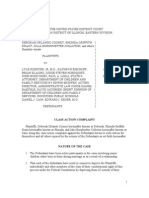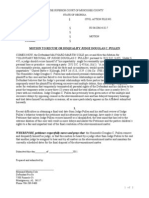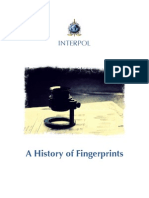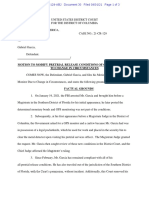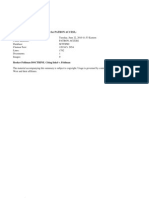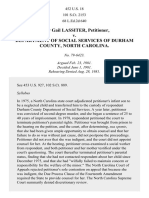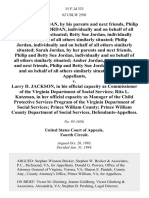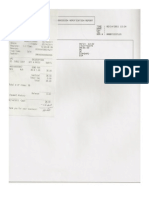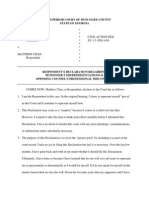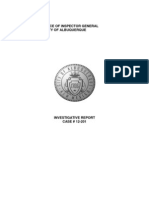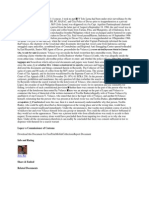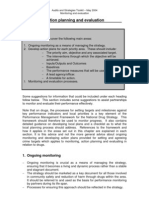Basic Motion To Suppress - Joseph Brewster - POLS 344
Basic Motion To Suppress - Joseph Brewster - POLS 344
Uploaded by
Mediation Joe BrewsterCopyright:
Available Formats
Basic Motion To Suppress - Joseph Brewster - POLS 344
Basic Motion To Suppress - Joseph Brewster - POLS 344
Uploaded by
Mediation Joe BrewsterOriginal Title
Copyright
Available Formats
Share this document
Did you find this document useful?
Is this content inappropriate?
Copyright:
Available Formats
Basic Motion To Suppress - Joseph Brewster - POLS 344
Basic Motion To Suppress - Joseph Brewster - POLS 344
Uploaded by
Mediation Joe BrewsterCopyright:
Available Formats
DISTRICT COURT OF NEW DUBLIN STATE OF NEW IRELAND
THE STATE OF NEW IRELAND vs. JEAN VALJEAN
CASE NO. 123456789
MOTION TO SUPPRESS EVIDENCE
COMES NOW MARY JANE GREEN, Defendant, and files her Motion to Suppress Evidence, pursuant to Rule 12(b)(3)(C) of the N.I. Rules of Criminal Procedure, and requests a hearing hereon in advance of trial, and would show unto the Court the following: 1. The evidence was obtained without a warrant. 2. The evidence was
The Fourth Amendment provides that "[t]he right of the people to be secure in their persons, houses, papers, and effects, against unreasonable searches and seizures, shall not be violated." "At the very core" of the Fourth Amendment "stands the right of a man to retreat into his own home and there be free from unreasonable governmental intrusion." Silverman v. United States, 365 U. S. 505, 511 (1961). With few exceptions, the question whether a warrantless search of a home is reasonable and hence constitutional must be answered no. See Illinois v. Rodriguez, 497 U. S. 177, 181 (1990); Payton v. New York, 445 U. S. 573, 586 (1980).
TO SUPPRESS THE FRUITS OF THE SEARCH THAT OCCURRED AT 3369 N. PALMER STREET ON MAY 17, 2005 To suppress the fruits of the search conducted at 3369 N. Palmer St., Milwaukee, on May 17, 2005 for the reason that the officers made a warrantless entry into the home without probable cause combined with exigent circumstances and the warrant that was later obtained was obtained through the use of the illegally seized evidence.
D. Statement of Standing and Need for Evidentiary Hearing. 12. The defendant, Lawrence Butler, hereby alleges and shows to the
court that on May 17, 2005 he was an overnight guest at 3369 N. Palmer Street and, therefore, he had a reasonable expectation of privacy in the home. That this expectation of privacy is one that the community is prepared to recognize and, therefore, that Butler has standing to challenge the search. 13. The government does not contest Butler's standing to challenge the search. The defendant hereby requests and evidentiary hearing for the purpose of establishing standing and for the purpose of resolving the disputed issues of fact. Additionally, it is requested that the court permit the parties to file their legal memoranda after the evidentiary hearing.
1. The deputies in this matter illegally entered and searched the residence and property without a warrant and without consent in violation of the Fourth Amendment of the United States Constitution. In addition, the open-view and/or exigent circumstances exception do not apply to the facts of this case. 2. Any alleged consent to search subsequent to the prior illegal search is tainted and not free and voluntary. 2.a. Evidence gained during an illegal search of a home before the officer's obtained a search warrant could not be relied upon to support the federal warrant. See, e.g., Murray v. United States, 487 U.S. 533, 536 (1988) (officers who illegally entered warehouse and observed bags of marijuana could not rely on their knowledge of the marijuana in support of application for warrant). Neither can an officer put false, misleading, or unsupported facts in a affidavit to obtain a warrant. See Franks v. Delaware, 438 U.S. 154 (1978) (intentionally false statement or omission regarding material fact requires suppression of evidence). 3. The initial entry to the home was illegal because any alleged consent to enter his home obtained from the defendant, to the extent that voluntary consent is claimed by the prosecutor for the State Attorney's Office in Tampa, Hillsborough County, or by the deputies was involuntary and coerced. 4. Furthermore, any inspection of the backyard or adjacent property was illegal because it is well established under Florida law that an uninvited and warrantless search of a side-yard area or a back-yard area violates the Fourth Amendment and subjects any evidence gathered from such a search to exclusion. State v. Morsman, 394 So.2d 409 (Fla. 1981) (seizure of marijuana plants in defendants backyard was illegal when plants were not visible to the public and police officer had no right to be in backyard); Maggard v. State, 736 So.2d 763 (Fla. 2d DCA 1999); Glass v. State, 736 So.2d 788 (Fla. 2d DCA 1999) (marijuana plants suppressed where officers had no right to enter backyard even when they saw people in the backyard). 5. Generally, people have an increased reasonable expectation of privacy in the backyard of their homes. Moorsman, supra.
6. In this case, the evidence is clear that the defendant had a reasonable expectation of privacy in his home, backyard, and the two story structure attached to his home. It is also clear that the deputies violated this expectation of privacy and the defendants Fourth Amendment rights by entering the back yard, and going up a outside staircase, without a warrant and without consent. 7. In addition, the deputies were not justified to conduct a warrantless search of the adjacent property based on the open-view exception. State v. Rickard, 420 So.2d 303 (Fla. 1982); Oliver v. State, 989 So.2d 16 (Fla. 2d DCA 2008). 8. In an open view situation, the police may not seize contraband observed from an adjacent lot without a warrant where the defendant has exhibited an actual expectation of privacy and there are no exigent circumstances. State v. Rickard, 420 So.2d 303, 307 (Fla. 1982). 9. An open-view situation is treated similarly to the plain-view exception except that some exigent circumstances [are] required to justify warrantless entry into the protected area in an open-view situation. Oliver v. State, 989 So.2d 16, 17 (Fla. 2d DCA 2008). 10. Initially, the evidence above establishes that there is no way that the deputy could have made any observations that were consistent with a grow house operation through anything he saw in an open view. 11. Having established that the entry and subsequent search of the interior of the main house and the exterior upstairs portion of the upstairs was illegal, any subsequent searches, seizures and statements allegedly obtained through consent are tainted and therefore not free and voluntary. 12. When the initial police activity is illegal, the State must establish by clear and convincing evidence that there has been an unequivocal break in the chain of illegality sufficient to dissipate the taint of prior illegal police action and thus render consent freely and voluntarily given. Maggard, supra, citing, Jordan v. State, 707 So.2d 338 (Fla. 2d DCA 1998); see also United States v. Quintana, 594 F.Supp.2d 1291 (M.D.Fla. 2009). 13. In this case, there is no evidence of an unequivocal break in the chain of illegality sufficient to dissipate the taint of the prior illegal entry and search. If anything, there is simply evidence of more illegality by the police officers through threats and coercion. As such, any alleged consent to search the resident, and any evidence seized from or statements obtained, are tainted and subject to exclusion. 14. On its own, the alleged consent in this case was not voluntarily and freely given. Consent may not be coerced, by explicit or implicit means, by implied threat or covert force. United States v. Quintana, 594 F.Supp.2d 1291, 1303 (M.D.Fla. 2009), quoting Schneckloth v. Bustamonte, 412 U.S. 218, 228 (1973). 15. In the instant case, our client did not sign any form that authorized the alleged consent to search the home or property. 16. It is undisputed by the officers that our client immediately requested the right to remain silent
and not answer any questions without his attorney being present. As such, any statements obtained from our client must be suppressed because they were taken in violation of his Miranda warnings. After the hearing on our motion, the Assistant State Attorney did not make any legal argument in support of the legality of the search. The Court found that based on the facts presented the allegations in the search warrant were false, based on illegally obtained evidence, or unsupported to the extend that the entire warrant and all evidence gained from it had to be suppressed. After granting our motion to suppress, the prosecutor acknowledge that the motion was dispositive (which means that the prosecutor had no evidence to support any of the charges). Therefore, the trial court also granted our motion to dismiss.
http://caselaw.lp.findlaw.com/cgi-bin/getcase.pl?court=us&vol=476&invol=207 http://www.law.cornell.edu/rules/frcrmp/rule_41
WHEREFORE, PREMISES CONSIDERED, Defendant prays that the Court hold a hearing on this motion and that this motion in all things be granted, and that the statement complained of herein be suppressed.
Respectfully submitted, _________________________ Daniel Webster SBN 99999999 1234 Main Street Clutch City, Texas 77002 (713) 228-1111 FAX (713) 228-2222
CERTIFICATE OF SERVICE This is to certify that a true and correct copy of the above and foegoing has been hand-delivered to the District Attorneys Office on this the _____ day of __________________, 2003.
__________________________ Daniel Webster
No. 000000 THE STATE OF TEXAS vs. JEAN VALJEAN IN THE DISTRICT COURT OF HARRIS COUNTY, TEXAS 999th JUDICIAL DISTRICT
ORDER GRANTING MOTION TO SUPPRESS CUSTODIAL STATEMENT OF DEFENDANT CAME ON FOR CONSIDERATION the Defendant's Motion to Suppress Custodial Statement of Defendant, and the Court, having examined such motion and heard evidence thereon, and arguments of counsel, and being of the opinion that the said Motion should be granted, and that the statement complained of in such motion was obtained illegally from Defendant and was involuntary. IT IS THEREFORE, ORDERED, ADJUDGED AND DECREED that the Defendant's Motion to Suppress Custodial Statement of Defendant is in all things GRANTED. It is further ORDERED, ADJUDGED AND DECREED that the Defendant's "Statement of Person in Custody" is hereby SUPPRESSED. it is further ORDERED, ADJUDGED AND DECREED that the State of Texas and its witnesses not mention, refer to, or elicit in any manner, any evidence that Defendant gave an oral or written confession or statement while in custody. It is further ORDERED that the attorney for the State instruct his witnesses concerning the terms of this Order. SIGNED this ______ day of __________________, 2003.
_____________________________ JUDGE PRESIDING
You might also like
- LA County AffidavitDocument15 pagesLA County Affidavitkeiji.hiramotoNo ratings yet
- Plaint - Rehan Sheikh V Brian KellyDocument10 pagesPlaint - Rehan Sheikh V Brian KellyVoice_MDNo ratings yet
- 102 - Motion To DismissDocument17 pages102 - Motion To DismissRipoff ReportNo ratings yet
- Judge James E. Towery and The Superior Court of California, County of Santa Clara - Response To ComplaintDocument11 pagesJudge James E. Towery and The Superior Court of California, County of Santa Clara - Response To ComplaintBen Z.No ratings yet
- Final Corrected Copy Federal SuitDocument43 pagesFinal Corrected Copy Federal SuitSilenceIsOppression100% (1)
- Motion To RecuseDocument1 pageMotion To RecuseMaynard1965No ratings yet
- Criminal Procedure OutlineDocument30 pagesCriminal Procedure OutlineMichael NazarianNo ratings yet
- A History of Fingerprints: InterpolDocument19 pagesA History of Fingerprints: InterpoljjeanNo ratings yet
- Cybercrime With 8484Document7 pagesCybercrime With 8484Jovie MasongsongNo ratings yet
- Petition for Certiorari: Denied Without Opinion Patent Case 93-1413From EverandPetition for Certiorari: Denied Without Opinion Patent Case 93-1413No ratings yet
- An Inexplicable Deception: A State Corruption of JusticeFrom EverandAn Inexplicable Deception: A State Corruption of JusticeNo ratings yet
- Petition for Extraordinary Writ Denied Without Opinion– Patent Case 94-1257From EverandPetition for Extraordinary Writ Denied Without Opinion– Patent Case 94-1257No ratings yet
- Petition for Certiorari Denied Without Opinion: Patent Case 96-1178From EverandPetition for Certiorari Denied Without Opinion: Patent Case 96-1178No ratings yet
- California Supreme Court Petition: S173448 – Denied Without OpinionFrom EverandCalifornia Supreme Court Petition: S173448 – Denied Without OpinionRating: 4 out of 5 stars4/5 (1)
- Motion To Object/strike Defendant's Amended "Answer"Document4 pagesMotion To Object/strike Defendant's Amended "Answer"Ed Furlong100% (1)
- McGuiness RulingDocument86 pagesMcGuiness RulingXerxes WilsonNo ratings yet
- 2 Court Awards of Emotional Distress Over 100,000Document11 pages2 Court Awards of Emotional Distress Over 100,000alexpsi14No ratings yet
- FL vs. Villaverde Order Granting Motion To DismissDocument6 pagesFL vs. Villaverde Order Granting Motion To DismissCharles FrazierNo ratings yet
- Verified Complaint Filed in Unlawful Transition of Child Without Parental ConsentDocument19 pagesVerified Complaint Filed in Unlawful Transition of Child Without Parental ConsentTim BrownNo ratings yet
- Declaration in Support of Motion To Set Aside Conviction - OREGONDocument1 pageDeclaration in Support of Motion To Set Aside Conviction - OREGONLaw Works LLC100% (1)
- Grazzini-Rucki AppealDocument22 pagesGrazzini-Rucki AppealmikekvolpeNo ratings yet
- Brief in Support of The Preliminary Objections 6.21.19Document30 pagesBrief in Support of The Preliminary Objections 6.21.19Carter WalkerNo ratings yet
- Motion To Dismiss All Evidence Involved With The CaseDocument6 pagesMotion To Dismiss All Evidence Involved With The CaseJones, WalkerNo ratings yet
- 4DCA Div1 Handout On WritsDocument9 pages4DCA Div1 Handout On WritsBunny FontaineNo ratings yet
- US Memorandum in OppositionDocument3 pagesUS Memorandum in OppositionJ RohrlichNo ratings yet
- Troxel v. Granville 530 U.S. 57 120 ST. CT. 2054Document28 pagesTroxel v. Granville 530 U.S. 57 120 ST. CT. 2054Thalia Sanders100% (1)
- Lassiter v. Department of Social Servs. of Durham Cty., 452 U.S. 18 (1981)Document34 pagesLassiter v. Department of Social Servs. of Durham Cty., 452 U.S. 18 (1981)Scribd Government DocsNo ratings yet
- Bench Memorandum: Exclusion of Evidence Due To Probable TamperingDocument9 pagesBench Memorandum: Exclusion of Evidence Due To Probable TamperingHon. William H. Burgess, III100% (1)
- United States Court of Appeals, Fourth CircuitDocument35 pagesUnited States Court of Appeals, Fourth CircuitScribd Government DocsNo ratings yet
- Defendant'S Motion To Dismiss With Prejudice For Lack of Probable Cause PlaintiffDocument3 pagesDefendant'S Motion To Dismiss With Prejudice For Lack of Probable Cause PlaintiffEvol LoveNo ratings yet
- Texas v. United States - ComplaintDocument137 pagesTexas v. United States - ComplaintjoshblackmanNo ratings yet
- Motion To Quash Indictments Because Judge Oldner's Cumulative Actions Compromised The Integrity of The Indictment ProcessDocument22 pagesMotion To Quash Indictments Because Judge Oldner's Cumulative Actions Compromised The Integrity of The Indictment ProcessThe Dallas Morning News100% (1)
- Letter To State's Attorney, Chief Judge, and Circuit Clerk About Official MisconductDocument28 pagesLetter To State's Attorney, Chief Judge, and Circuit Clerk About Official MisconductMarc MkKoy100% (1)
- JQC Complaint No. 12554 Judge Martha J CookDocument10 pagesJQC Complaint No. 12554 Judge Martha J CookNeil GillespieNo ratings yet
- Civil Pro OutlineDocument67 pagesCivil Pro Outlinemjwyatt01No ratings yet
- Virginia Court of Appeals - Motion For Expedited Hearing and Decision 1585-23-4 (Williams V Rapp BOS, Et - Al.Document36 pagesVirginia Court of Appeals - Motion For Expedited Hearing and Decision 1585-23-4 (Williams V Rapp BOS, Et - Al.newsNo ratings yet
- Rhodes Motion For Judicial NoticeDocument493 pagesRhodes Motion For Judicial Noticewolf woodNo ratings yet
- D.C. Circuit Court of Appeals Grants Flynn Writ of MandamusDocument38 pagesD.C. Circuit Court of Appeals Grants Flynn Writ of MandamusLaw&Crime100% (1)
- Diahann Sibley-Messegur vs. Ted Fredenburg: Sevier County S T A C S Page 1 of 1 Case NumberDocument2 pagesDiahann Sibley-Messegur vs. Ted Fredenburg: Sevier County S T A C S Page 1 of 1 Case Numberemily crowderNo ratings yet
- Motion To Dismiss - No JurisdictionDocument5 pagesMotion To Dismiss - No JurisdictionCopBlock100% (1)
- First Circuit Judges and Clerk Appear Determined To Reach CORRUPT and PRE-DETERMINED Outcome in HARIHAR V THE UNITED STATESDocument11 pagesFirst Circuit Judges and Clerk Appear Determined To Reach CORRUPT and PRE-DETERMINED Outcome in HARIHAR V THE UNITED STATESMohan HariharNo ratings yet
- Criminal Cases JURISDICTIONDocument9 pagesCriminal Cases JURISDICTIONPeeve Kaye BalbuenaNo ratings yet
- Exhibit List For Fraud On The CourtDocument8 pagesExhibit List For Fraud On The CourtVirginia Law100% (1)
- Fee Waiver and Order - Mc20Document2 pagesFee Waiver and Order - Mc20Jeff NewtonNo ratings yet
- United States Court of Appeals, Eleventh CircuitDocument12 pagesUnited States Court of Appeals, Eleventh CircuitScribd Government DocsNo ratings yet
- Wisconsin University Staffer Sues, Claiming She Was Demoted in Campus Diversity Office For Being WhiteDocument20 pagesWisconsin University Staffer Sues, Claiming She Was Demoted in Campus Diversity Office For Being WhiteZachary RogersNo ratings yet
- ContemptPacket Cobb CountyDocument11 pagesContemptPacket Cobb CountyWilliam H. Basinger100% (1)
- THE # 1 RICO Case Setting Precedent - U.S. V Turkett 452 U.S. 576 (1981)Document21 pagesTHE # 1 RICO Case Setting Precedent - U.S. V Turkett 452 U.S. 576 (1981)Marina Read100% (1)
- Hurley Motion SupressDocument16 pagesHurley Motion SupressHayden SmithNo ratings yet
- Petition For Cert To CO Supreme Court - 12.17.20Document90 pagesPetition For Cert To CO Supreme Court - 12.17.20The ForumNo ratings yet
- Motion To Vacate Judgment LawDocument2 pagesMotion To Vacate Judgment Lawdbush2778100% (2)
- Refusal To Set Motion For Hearing, Grounds For Refusal Not ProvidedDocument2 pagesRefusal To Set Motion For Hearing, Grounds For Refusal Not ProvidedKevin TalbertNo ratings yet
- Rutherford Probation LawsuitDocument74 pagesRutherford Probation LawsuitUSA TODAY NetworkNo ratings yet
- Ellis v. Chan: Declaration Regarding Petitioner's Misrepresentations - Opposing Counsel's MisconductDocument45 pagesEllis v. Chan: Declaration Regarding Petitioner's Misrepresentations - Opposing Counsel's MisconductExtortionLetterInfo.comNo ratings yet
- Petition for Certiorari – Patent Case 01-438 - Federal Rule of Civil Procedure 52(a)From EverandPetition for Certiorari – Patent Case 01-438 - Federal Rule of Civil Procedure 52(a)No ratings yet
- Pocket Constitution: The Declaration of Independence, Constitution and Amendments: The Constitution at your fingertips, V3From EverandPocket Constitution: The Declaration of Independence, Constitution and Amendments: The Constitution at your fingertips, V3No ratings yet
- How one of my Pro-se cases got destroyed by federal rogue judgesFrom EverandHow one of my Pro-se cases got destroyed by federal rogue judgesNo ratings yet
- Constitution of the State of Minnesota — 1964 VersionFrom EverandConstitution of the State of Minnesota — 1964 VersionNo ratings yet
- Petition To UnsealDocument52 pagesPetition To UnsealBrian Dlugosz100% (1)
- Kathleen White Full Report (OIG)Document18 pagesKathleen White Full Report (OIG)Albuquerque JournalNo ratings yet
- Arthur Conan Doyle - Wikipedia, The Free EncyclopediaDocument12 pagesArthur Conan Doyle - Wikipedia, The Free EncyclopediabmxengineeringNo ratings yet
- California v. Greenwood, 486 U.S. 35 (1988)Document18 pagesCalifornia v. Greenwood, 486 U.S. 35 (1988)Scribd Government DocsNo ratings yet
- Espano Vs CADocument3 pagesEspano Vs CAMa Gabriellen Quijada-TabuñagNo ratings yet
- Edward Spannaus v. U.S. Department of Justice, 813 F.2d 1285, 4th Cir. (1987)Document7 pagesEdward Spannaus v. U.S. Department of Justice, 813 F.2d 1285, 4th Cir. (1987)Scribd Government DocsNo ratings yet
- Capstone PresentationDocument18 pagesCapstone Presentationapi-307180117No ratings yet
- Locards PrincipleDocument4 pagesLocards Principleapi-302019977No ratings yet
- Trial Exhibit 433 CV of Marc LeBeauDocument13 pagesTrial Exhibit 433 CV of Marc LeBeauDave MosherNo ratings yet
- June 2014 JbpaDocument12 pagesJune 2014 JbpajsergiomcostaNo ratings yet
- PP Vs MuletaDocument16 pagesPP Vs MuletaLhine KiwalanNo ratings yet
- Dracula Theme of PassivityhjbDocument3 pagesDracula Theme of PassivityhjbAwatif AfzalNo ratings yet
- Streetsblog For PWPB - Police RelationsDocument15 pagesStreetsblog For PWPB - Police RelationsDamien NewtonNo ratings yet
- The Creeping Man ScurtatDocument2 pagesThe Creeping Man ScurtatMălina FloreaNo ratings yet
- Course Description Silabus ChfiDocument2 pagesCourse Description Silabus ChfiMONET™ - MOJOKERTO DOT NETNo ratings yet
- George Sloan v. Jack Cowley, Warden of Joe Harp Correctional Facility The Attorney General of The State of Oklahoma, 977 F.2d 596, 10th Cir. (1992)Document4 pagesGeorge Sloan v. Jack Cowley, Warden of Joe Harp Correctional Facility The Attorney General of The State of Oklahoma, 977 F.2d 596, 10th Cir. (1992)Scribd Government DocsNo ratings yet
- Lesson 1 PDFDocument8 pagesLesson 1 PDFInstead RepentNo ratings yet
- Lopez Vs Commissioner of Customs: Jeric ReiDocument6 pagesLopez Vs Commissioner of Customs: Jeric ReimackoygonzagaNo ratings yet
- T5 B9 Doc Requests FDR - Entire Contents - Emails - Doc Requests - Responses - Lists - Withdrawal Notice 709Document26 pagesT5 B9 Doc Requests FDR - Entire Contents - Emails - Doc Requests - Responses - Lists - Withdrawal Notice 7099/11 Document ArchiveNo ratings yet
- Aztec Ufo IncidentDocument19 pagesAztec Ufo IncidentChun-Hin Shum100% (2)
- UK Home Office: Aud05Document14 pagesUK Home Office: Aud05UK_HomeOfficeNo ratings yet
- AlexandriaDocument6 pagesAlexandriapicassaaNo ratings yet
- BushDocument49 pagesBushvolvaros50% (2)
- CPN-CSPC Protocol 26nov2014Document136 pagesCPN-CSPC Protocol 26nov2014John J. MacasioNo ratings yet
- Investigation Process - Role of Courts PDFDocument177 pagesInvestigation Process - Role of Courts PDFVenkat Raman J100% (2)
- Topic ProposalDocument3 pagesTopic Proposalapi-338204905No ratings yet
- Stingrey Warrant Darren ChakerDocument91 pagesStingrey Warrant Darren ChakerDarren ChakerNo ratings yet




